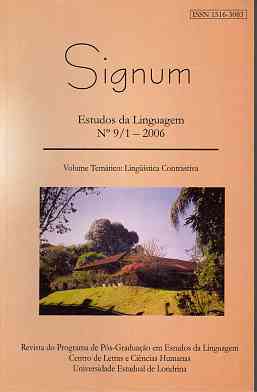Error Analysis Model applied to the written production of deaf students: a study of Prepositions in Portuguese as a Second Language
DOI:
https://doi.org/10.5433/2237-4876.2006v9n1p11Keywords:
Error Analysis, Written Production, Deaf.Abstract
According to Bilingualism, Brazilian Sign Language is seen as the deaf's first language, and Portuguese as their second language, approximating the studies on Portuguese acquisition by the deaf to the work related to second language teaching and learning. Based on such theoretical background, this study investigated the written production of 20 bilingual deaf students attending from 5th to 8th grade at Instituto Londrinense de Educação de Surdos (Londrina Institute of Education for the Deaf), describing how these subjects deal with prepositions in the Portuguese Language. For such, the Error Analysis Model was used in order to identify, classify, and explain the errors related to the prepositions that the deaf learners produced when writing texts in Portuguese. The results indicated the omission of the prepositions a (to), até (until), com (with), de (of, from), em (in, on, at), para (to, for), por (by, for), and sobre (about, on), which showed a tendency to fossilization. The present research contributes to the sedimentation of new educational paradigms and to the search for effective methodological ways to teach Portuguese as a second language for the deaf.
Downloads
Downloads
Published
How to Cite
Issue
Section
License
Copyright (c) 2025 Patricia Aspilicueta

This work is licensed under a Creative Commons Attribution-NonCommercial-NoDerivatives 4.0 International License.
This journal reserves the right to make, in the originals, normative, orthographic and grammatical modifications in order to maintain the standard language and the credibility of the publication. It will respect, however, the authors' style of writing. Modifications, corrections and suggestions of conceptual order will be forwarded to the authors, if necessary. In these cases, the papers, once appropriate, should be submitted to a new appreciation. The final examinations will not be forwarded to the authors. Works published become property of Signum, being its total or partial reprint subject to an explicit authorization of the journal. In all subsequent quotes the original source of publication should be mentioned, in case, in Photographic Discourse. Opinions emitted by the authors are their exclusive responsibility.
















